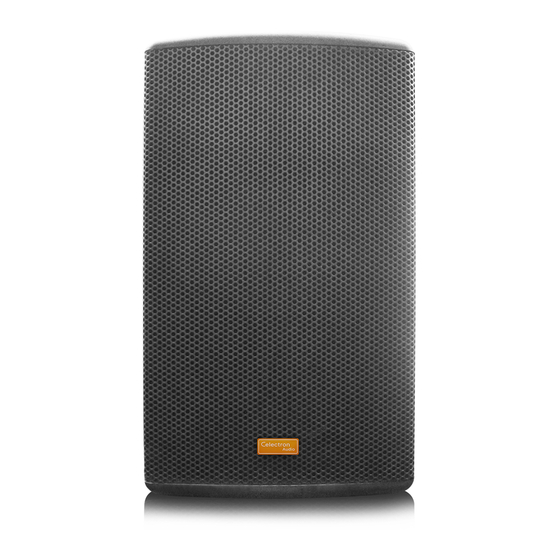Celectron Audio AP-1615 사용자 설명서 - 페이지 5
{카테고리_이름} Celectron Audio AP-1615에 대한 사용자 설명서을 온라인으로 검색하거나 PDF를 다운로드하세요. Celectron Audio AP-1615 9 페이지.

SAFETY AND PRECAUTIONS
•
CAUTION: before using this product read carefully the following safety instruc. ons. Take a look of this manual en rely and preserve it for
future reference.
When using any electric product, basic precau ons should always be taken, including the following:
– To reduce the risk, close supervision is necessary when the product is used near children.
– Protect the apparatus from atmospheric agents and keep it away from water, rain and high humidity places.
– This product should be site away from heat sources such as radiators, lamps and any other device that generate heat.
– This product should be located so that its loca on or posi on does not interfere with its proper ven la on and hea ng dissipa on.
– Care should be taken so that objects and liquids do not go inside the product.
– The product should be connected to a power supply mains line only of the type described on the opera ng instruc ons or as marked on the
product. Connect the apparatus to a power supply using only power cord included making always sure it is in good condi ons.
–
WARNING: The mains plug is used as disconnect device, the disconnect device shall remain readily operable.
– Do not cancel the safety feature assured by means of a polarized line plug (one blade wider than the other) or with a earth connec on.
– Make sure that power supply mains line has a proper earth connec on.
– Power supply cord should be unplugged from the outlet during strong thunderstorm or when le unused for a long period of me.
– Do not place objects on the product's power cord or place it in a posi on where anyone could trip over, walk on or roll anything over it. Do not
allow the product to rest on or to be installed over power cords of any type. Improper installa ons of this type create the possibility of fi re hazard
and/or personal injury.
– This product may be capable of producing sound levels that could cause
permanent hearing loss. Exposure to extremely high noise levels may cause
permanent hearing loss. Individuals vary considerably in suscep bility to noise-
induced hearing loss, but nearly everyone will lose some hearing if exposed
to sufficiently intense noise for a period of time. The U.S. Government's
Occupational Safety and Health Administration (OSHA) has specified the
permissible noise level exposures shown in the following chart. According to
OSHA, any exposure in excess of these permissible limits could result in some
hearing loss. To ensure against poten ally dangerous exposure to high sound
pressure levels, it is recommended that all persons exposed to equipment
capable of producing high sound pressure levels use hearing protectors while
the equipment is in opera on. Ear plugs or protectors in the ear canals or over
the ears must be worn when opera ng the equipment in order to prevent
permanent hearing loss if exposure is in excess of the limits set forth here. Keep
your's a en on that children and pets are more suscep ble to excessive noise
levels.
IN CASE OF FAULT
• In case of fault or maintenance this product should be inspected only by qualifi ed service personnel when:
– There is a fl aw either in the connec ons or in the supplied connec ng cables.
– Liquids have spilled inside the product.
– The product has fallen and been damaged.
– The product does not appear to operate normally or exhibits a marked change in performance.
– The product has been lost liquids or gases or the enclosure is damaged.
• Do not operate on the product, it has no user-serviceable parts inside, refer servicing to an authorized maintenance centre.
TROUBLESHOOTING
No Power
• The loudspeaker's "POWER" switch is off .
• Make sure the mains AC outlet is live (check with a tester or a lamp).
• Make sure the mains plug is securely plugged into mains AC outlet.
No Sound
• Is the input LEVEL control for the channel turned up?
• Is the SIGNAL LED illuminated? If not check if your signal level is too low or check the signal cable, mixer and other
equipment se ng and cabling.
• Are you sure your signal cables works properly? check it using a cable tester or replacing with a new one.
• Is the SPEAKON cable connector correctly inserted? turn it clockwise un l it clicks.
• Are you sure your power cable works properly? check it using a cable tester or replacing with a new one.
Distorted Sound
• Input signal level is too high. Turn down your level controls.
NOTE: The loudspeakers should never be operated at a level which causes the amplifi er Clip LEDs to illuminate
constantly.
Diff erent channel
• Check if are using a balanced cable for one channel and an unbalanced one for the other, as this would cause a
level
considerable diff erence in channel levels.
• Be sure that your loudspeaker system is fully connected and both loudspeakers have the same impedance.
Noise / Hum
• Whenever possible, preferably use only balanced cables. Unbalanced lines may also be used but may result in noise
over long cable runs.
• Some mes it helps to plug all audio equipment into the same AC circuit so they share a common ground.
Dura on Per Day
Sound Level dBA
Typical
In Hours
Slow Response
Example
8
90
Duo in small club
6
92
4
95
Subway Train
3
97
2
100
Very loud classical music
1.5
102
1
105
Traffi c noise
0.5
110
0.25 or less
115
Loudest parts at a rock concert
5
